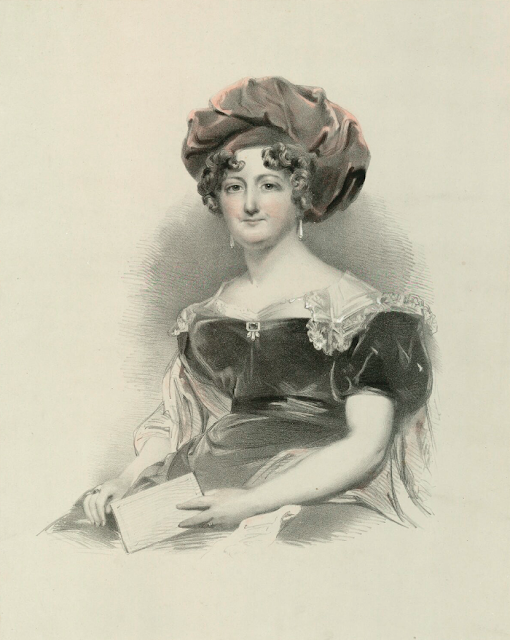 |
Princess Mary, Duchess of Gloucester and Edinburgh. Picture (c) National Portrait Gallery, London. |
The following are the contents of a letter written by the Princess Mary, daughter of King George III and Queen Charlotte, to Lady Harcourt in 1816. The princess elaborates on how she has decided to wed her first cousin, the Duke of Gloucester. Prince William, Duke of Gloucester, and Princess Mary, Duchess of Gloucester, were married for eighteen years before the death of the duke; the couple did not have children.
My very dear Lady Harcourt,
I found your most kind and affectionate note on my table late night on my return from Windsor. I never could doubt all your kind feelings on hearing of my intended marriage; and I am unhappy I did not write myself to you, as I look upon you quite as a 2nd mother, & respect you as such; but the real truth is, that, though the Q. and Prince gave their consent on Saturday, & felt satisfied all was settled, I was not quite so myself untill last night. However, I started a subject to the D. of Gloucester that required a very decided answer, before I could make up my mine to change my intention. I got a satisfactory answer last night through the D. of York, therefore I can now say we compleatly understand each other. When I see you I will explain this.
I don't know what other people feel when going to be married, but as yet I have done nothing but cry. I have been half killed with the kindness of the Queen and all my Brothers & Sisters, & such a day as I passed at Windsor yesterday is more than I can describe. That dear Castle, which contains all I value in this world; that dear place, in which I have passed so many happy days; that spot in which my most valuable & respectable Father is incircled. That, Alass, I am not to receive his Blessing and approbation, with those of all the rest of the family, half kills me; and the idea of heaving that House at Moments half breaks my heart. But the D. of Gloucester has so kindly entered into all my feelings, so faithfully promised that I shall be as much with my family as possible, and is so convinced how it is in my power to do my duty as his wife, as well as to do my duty at Windsor (to a certain degree), that it makes me thank God.
His house is so near, only 3 miles, as to admit of all this.
Yours affectionally,
Mary.
Source: The Royal Dukes and Princesses of the Family of George III: A View of Court Life and Manners for Seventy Years, 1760-1830 (Volume 2) by Percy Hetherington Fitzgerald, 1882.
As we conclude our exploration of the letter from Princess Mary, Duchess of Gloucester, to Lady Harcourt, we are reminded of the intricate web of relationships within the royal family. The letter, dated 1816, offers a rare glimpse into the personal struggles and triumphs of a royal family member navigating the complexities of family dynamics and royal protocol. Princess Mary's candid reflections on her decision to marry her first cousin, Prince William, Duke of Gloucester, serve as a testament to the importance of family ties and the influence of royal protocol on personal choices.
As we reflect on the significance of this letter, we are reminded of the historical context in which it was written. The letter is a window into the world of the British royal family during the early 19th century, a time marked by strict social norms and expectations. Princess Mary's decision to marry her first cousin, despite the potential controversy, highlights the complexities of royal relationships and the influence of family on personal decisions. As we close this article, we are left with a deeper appreciation for the intricate web of relationships within the royal family and the historical significance of this letter in understanding the complexities of royal protocol and family dynamics.





No comments:
Post a Comment